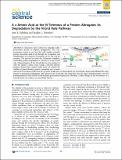| dc.contributor.author | Rabideau, Amy | |
| dc.contributor.author | Pentelute, Bradley L. | |
| dc.date.accessioned | 2017-07-10T19:22:29Z | |
| dc.date.available | 2017-07-10T19:22:29Z | |
| dc.date.issued | 2015-11 | |
| dc.date.submitted | 2015-09 | |
| dc.identifier.issn | 2374-7943 | |
| dc.identifier.issn | 2374-7951 | |
| dc.identifier.uri | http://hdl.handle.net/1721.1/110605 | |
| dc.description.abstract | Eukaryotes have evolved the ubiquitin (Ub)/proteasome system to degrade polypeptides. The Ub/proteasome system is one way that cells regulate cytosolic protein and amino acids levels through the recognition and ubiquitination of a protein’s N-terminus via E1, E2, and E3 enzymes. The process by which the N-terminus stimulates intracellular protein degradation is referred to as the N-end rule. Characterization of the N-end rule has been limited to only the natural l-amino acids. Using a cytosolic delivery platform derived from anthrax lethal toxin, we probed the stability of mixed chirality proteins, containing one d-amino acid on the N-terminus of otherwise all l-proteins. In all cases, we observed that one N-terminal d-amino acid stabilized the cargo protein to proteasomal degradation with respect to the N-end rule. We found that since the mixed chirality proteins were not polyubiquitinated, they evaded N-end-mediated proteasomal degradation. Evidently, a subtle change on the N-terminus of a natural protein can enhance its intracellular lifetime. | en_US |
| dc.description.sponsorship | MIT Faculty Start-up Fund | en_US |
| dc.description.sponsorship | Massachusetts Institute of Technology. Charles E. Reed Faculty Initiative Fund | en_US |
| dc.description.sponsorship | National Science Foundation (U.S.) (CAREER Award CHE-1351807) | en_US |
| dc.description.sponsorship | Damon Runyon Cancer Research Foundation | en_US |
| dc.description.sponsorship | National Science Foundation (U.S.). Graduate Research Fellowship Program | en_US |
| dc.language.iso | en_US | |
| dc.publisher | American Chemical Society (ACS) | en_US |
| dc.relation.isversionof | http://dx.doi.org/10.1021/acscentsci.5b00308 | en_US |
| dc.rights | Article is made available in accordance with the publisher's policy and may be subject to US copyright law. Please refer to the publisher's site for terms of use. | en_US |
| dc.source | ACS | en_US |
| dc.title | A d-Amino Acid at the N-Terminus of a Protein Abrogates Its Degradation by the N-End Rule Pathway | en_US |
| dc.type | Article | en_US |
| dc.identifier.citation | Rabideau, Amy E., and Bradley L. Pentelute. “A d-Amino Acid at the N-Terminus of a Protein Abrogates Its Degradation by the N-End Rule Pathway.” ACS Central Science 1.8 (2015): 423–430. © 2015 American Chemical Society | en_US |
| dc.contributor.department | Massachusetts Institute of Technology. Department of Chemistry | en_US |
| dc.contributor.mitauthor | Rabideau, Amy | |
| dc.contributor.mitauthor | Pentelute, Bradley L. | |
| dc.relation.journal | ACS Central Science | en_US |
| dc.eprint.version | Final published version | en_US |
| dc.type.uri | http://purl.org/eprint/type/JournalArticle | en_US |
| eprint.status | http://purl.org/eprint/status/PeerReviewed | en_US |
| dspace.orderedauthors | Rabideau, Amy E.; Pentelute, Bradley L. | en_US |
| dspace.embargo.terms | N | en_US |
| dc.identifier.orcid | https://orcid.org/0000-0003-2659-7012 | |
| mit.license | PUBLISHER_POLICY | en_US |
